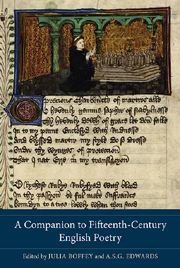Book contents
- Frontmatter
- Contents
- List of Contributors
- List of Abbreviations
- Conventions
- Introduction
- Part I Background and Context
- Part II Authors
- 3 Thomas Hoccleve
- 4 Thomas Hoccleve's Regiment of Princes
- 5 John Lydgate's Major Poems
- 6 John Lydgate's Religious Poetry
- 7 John Lydgate's Shorter Secular Poems
- 8 John Capgrave and Osbern Bokenham: Verse Saints' Lives
- 9 Peter Idley and George Ashby
- 10 John Audelay and James Ryman
- Part III Themes and Genres
- Chronology
- Index of Manuscripts
- General Index
5 - John Lydgate's Major Poems
from Part II - Authors
Published online by Cambridge University Press: 05 July 2013
- Frontmatter
- Contents
- List of Contributors
- List of Abbreviations
- Conventions
- Introduction
- Part I Background and Context
- Part II Authors
- 3 Thomas Hoccleve
- 4 Thomas Hoccleve's Regiment of Princes
- 5 John Lydgate's Major Poems
- 6 John Lydgate's Religious Poetry
- 7 John Lydgate's Shorter Secular Poems
- 8 John Capgrave and Osbern Bokenham: Verse Saints' Lives
- 9 Peter Idley and George Ashby
- 10 John Audelay and James Ryman
- Part III Themes and Genres
- Chronology
- Index of Manuscripts
- General Index
Summary
John Lydgate (c.1370–1449) was a Benedictine monk of the abbey of Bury St Edmunds, who entered the novitiate at age 15 and in his forties served for several years as prior of Hatfield Broad Oak (Hatfield Regis) in Essex. He was also indisputably the most prominent vernacular poet in England in the first half of the fifteenth century. Over the course of his writing career, he produced an astonishing amount of verse – in the order of 145,000 lines (Pearsall 1970: 4). He wrote in a wide array of genres, ranging from secular accounts of ancient military conflicts, such as two of the major poems considered here, to sophisticated and accomplished devotional works, such as The Life of Our Lady, to proto-dramatic pieces such as The Mumming at Windsor, to the popular courtesy poem Stans puer ad mensam. Correspondingly broad is the social scope of his recorded patrons, which ranges from royalty to ecclesiastical leaders, to London guilds and country gentry. And manuscripts of his works, which survive in the hundreds, enjoyed high circulation in his own lifetime, unlike those of his Ricardian predecessors; hence it is also no surprise that his characteristic aureate style was markedly influential, adopted by poets throughout the century, some of whom explicitly cite him as a poetic authority.
Against the backdrop of Lydgate's remarkable poetic output, what one first notices about his major poems is, inevitably, their staggering individual sizes: at 30,117 and 36,365 lines, respectively, Troy Book (begun 1412, completed 1420) and Fall of Princes (begun 1431, completed c.1439) account for nearly half of his verse.
- Type
- Chapter
- Information
- A Companion to Fifteenth-Century English Poetry , pp. 59 - 72Publisher: Boydell & BrewerPrint publication year: 2013

